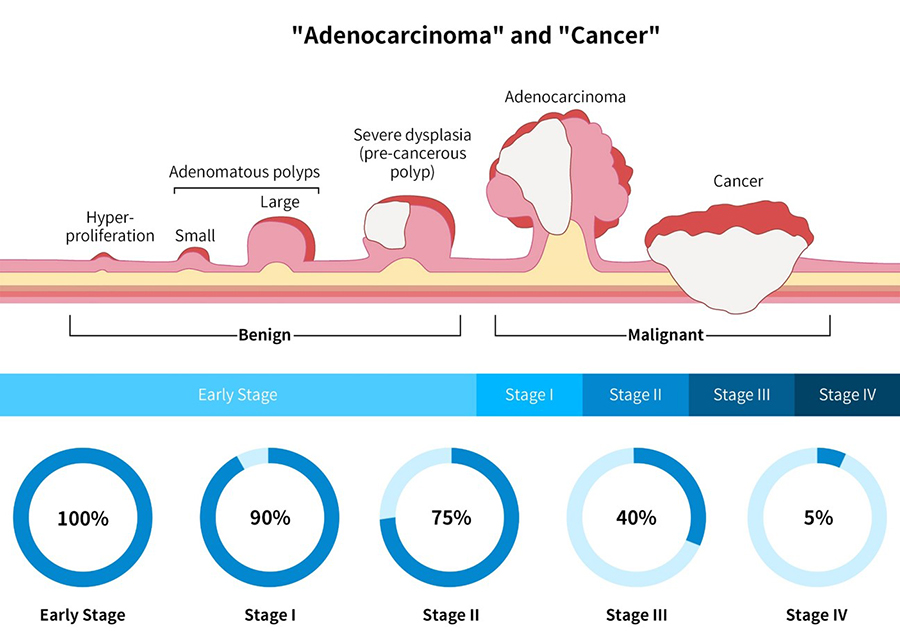As colorectal cancer for the under 50s rises, regular screening is vital to facilitate earlier treatment l BGI Perspectives
2022-09-24
Colorectal cancer does not just affect older people. In the United States, people under 50 years of age, both men and women, have an increased risk of this disease relative to people above this age. Dr. Songphol Malakorn, a colorectal surgeon from Chulalongkorn Hospital, Thailand, highlighted this stark statistic when interviewed as part of BGI Genomics’ "Your Health, Our Concern" series.
He is also a professor at the Department of Surgery, Chulalongkorn University and shares insights regarding colorectal cancer, screening advice, and treatment options.
Colorectal cancer
incidence rising
Thailand has seen an increase of about 18,000 colorectal cancer patients per year since 2018. Unfortunately, the number of colorectal cancer patients is now growing by 20,000 per year. Obesity, consumption of red meat and highly processed foods such as sausage and smoked bacon are likely to increase the risk of colorectal cancer.
A recently published study in Nature Reviews Clinical Oncology revealed the incidence of 14 types of cancers – including colorectal cancer – diagnosed in people under 50 years of age has been rising in many parts of the world since the 1990s. Apart from diet, lifestyle, obesity, environmental exposures and the microbiome has changed substantially.
The worrying trend of late detection
If we make a comparison between Thai and American people's gastrointestinal problems, colorectal cancer is the third most common cancer in both the United States and Thailand. There is a difference, though. Dr. Songphol mentions, "Patients in the United States visit a doctor as soon as the slightest symptoms occur, thus detecting colorectal cancer at an early stage, while patients in Thailand only go to see the doctor when they encounter severe symptoms."
Do not ignore red flags
Abnormal bowel movements are a clear warning. When you usually have one bowel movement per day that suddenly increases to 3-4 per day, have difficulty in regular excretion, and suffer from recurring constipation or diarrhea. In such cases, you need to see a doctor as soon as possible.

When should a colorectal screening test be performed?
Colorectal cancer can be asymptomatic. Dr. Songphol, therefore, recommends that also people with no symptoms or family history take a screening test, as early detection offers more treatment options and a higher chance of success. Periodical screening is currently recommended for asymptomatic patients who are 45 years old or older.
Colorectal screening options
As it can detect even a tiny sarcoma and then remove it, a colonoscopy is the most precise and effective colorectal cancer screening method. Alternatively, a stool test should be performed to see if it shows blood or clotted DNA. A stool test every 1-3 years is generally recommended. If colonoscopy shows no problem, you can check again every 5 to 10 years. This is because the process of cancer development, from the changes of genetically normal epidermis to the formation, growth, cancerization of polyps and eventual conversion process into cancer usually takes over five years.
Colorectal cancer treatment options
Dr. Songphol emphasized that early screening facilitates treatment options that are less complicated with a higher chance of success. "It allows us to detect a problem before it becomes cancerous. If it's just a normal polyp, we cut it off and it's done. But if it has turned into cancer already, we must take a biopsy sample, see if it's a malignant tumor, and do more checks. Treatment depends on how long and how far it has developed. If it's in the early stage, surgical removal will suffice. But if it has spread elsewhere, depending on tumor mass location and development, combination treatment with other therapies such as chemo or radiotherapy will be needed."
Medical technology and how it helps surgeons treat patients
Dr. Songphol explains how technology plays an important role in colorectal cancer treatment, "Surgery used to be done through an incision in the abdomen, but nowadays, we perform a minimally invasive surgery with a small incision. We stick the camera through the belly button and drill a small hole, similar to a dot. We control the surgical robot with our own hands. Using a surgical robot is an advantage as its hands can turn more freely so that doctors can work more precisely. The three-dimensional camera allows us to see with more depth of field."
Tips to reduce colorectal cancer risk
Cancer prevention starts with a balanced, moderate diet. Second, avoid being overweight. We don't have a precise explanation yet for why obese people are more likely to get colorectal cancer, but one thing is for sure: there’s a higher risk if you're overweight. Third, quit drinking and smoking, as it's scientifically proven that cigarettes and alcohol raise the risk for many types of cancer, including colorectal cancer. Last but not least, when you reach a certain age, go for regular screening tests.
About BGI Genomics
BGI Genomics, headquartered in Shenzhen, China, is the world's leading integrated solutions provider of precision medicine. Our services cover more than 100 countries and regions, involving more than 2,300 medical institutions. In July of 2017, as a subsidiary of BGI Group, BGI Genomics (300676.SZ) was officially listed on the Shenzhen Stock Exchange.